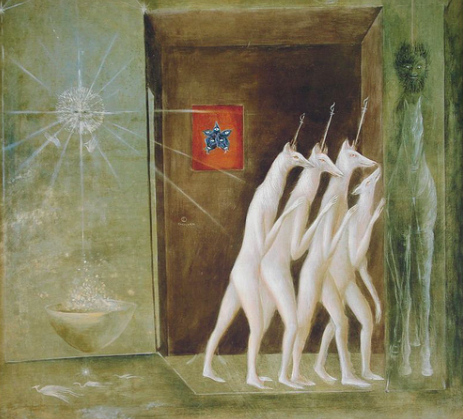|
Isis, or The Lover Learns by Losing We who are left behind pray to stones. We beseech walls and bricks for answers. Driving south on CA-380, my husband pulls off suddenly, sends the car shuddering—he’s been summoned by a ghost. I chase him across the undulating green of Golden Gate National Cemetery; the thick-bladed grass slices my bare ankles bloody. We get lost in labyrinthine rows of white headstones tumbling downhill like teeth; at the end of one, he stumbles on his surname, Burdick. There, he falls to his father’s breast: the famed warrior-poet genius, dead at forty-seven. He sets his head on the marker, sun-glittering with minerals, and sobs. Asks the Father-Stone for solace. Asks me to take a photo of them, though there is only man and stone and green, his godlike father, nowhere to be seen. Don’t you dare cry, his mother hissed before the cameras flashed. He was nine. It happened to me at sixteen, except it was my mother. I couldn’t cry either, though no one forbade it. My heart simply stopped beating. My mother’s friends commended my strength: she’s like Phyllis, a solid building with good bones. My mother was a lover to her marrow—she did have good bones—and broad birthing hips and bountiful breasts. That’s where trouble brewed—breasts and lymph nodes, both removed—a jagged gash across her chest. A swarm of wonky cells slunk from the cut and hid in the folds of her brain. When she turned forty-five her hive-mind exploded: a thousand bits of buzzing black stung her senseless. She’s buried in a veteran’s cemetery, too, next to her father-in-law because we couldn’t bear for her to be dead alone. An inane fate only the living fear. This is my husband’s first journey to his father’s grave in fifty-six years. First time he cried over his father’s death by widow-maker. On his knees, my husband shudders like our car, jerked from the highway by his father’s ghost. “I want more of this,” he says. Red-faced and wet, he suckles the pleasure of release, trembling with longing the way he long ago trembled for me. He asks if I’ve felt this, if I’ve been to my mother’s grave. I shrug. No. And yes. As a child I prayed to her consecrated bones each week. They lay in Sun City, Arizona, across the road from a golf course, the emerald lawn identically lush on both sides. My Mother-Stone yielded no answers though I knocked for years. I wish we had buried her naked rather than in the navy blue skirt-suit my teenage self picked out. No clothes, no lacquered casket, no more chemicals pumped through her chemo-logged body. I’m surprised there was room in her veins. Laid in a box, she held together the form we found so pleasing, but she didn’t owe us a final viewing, a private peep show. The mortician sewed her lips into a permanent smile so that, even in death, she could assure us everything was alright. I wish we had let the lady rest. Let her loose. Let her frown. Let her fall apart. Let go of her goodness, her fortitude. Set her free. Let her disintegrate into the earth. I don’t know if I’m speaking of my mother or me. My husband wants to know if I’ve cried. Sure. Inside. Every day. On the knife-edge of fifty, my friends are just beginning to lose their parents. They fall into my arms and sob like children. In the darkest chamber of my necrotic heart, I shrug. Of course—it’s awful. How did you not know? The hole was hollowed out of me so long ago the vacancy feels normal. Still, I marvel: why are they surprised? Death is holding our hand all the time. It’s inside us, if we look. At sixteen, I was promised the crushing sadness would wane. (Lies.) All my life, I’ve run from love because I know: loveis what hurts, not death. Yet here I am at this late hour, loving one more person, his grayed head laid on his dad’s gravestone, grieving. Last March, it was nearly his turn to make me a widow. Five surprise bypasses; one aortic valve donated from a pig who didn’t sign a consent form. The child we’ll never have tugs at my sleeve. Asks how I dare love this man in a world where nothing lasts and everything dies. I don’t know. It’s not normal. It’s exceptional. The day lockdown began, a masked man stopped my husband’s heart for seven hours, massaged it like clay, wove his breast closed with wire—twice. My husband—god of my underworld, of night, of beginnings and endings, of shuddersand sobs, his breastbone cracked in twain—the surgeon saved him, but I put the rest of him back together, save the missing part. Why I whisper on my knees in the grass, my head pressed to his chest. Why bother. This insignificantsandbag set against an inevitable tide. My husband chuckles. Laps the golden amber leaching from my scars, and outlines the means and end like it’s simple: It’s in the nature of suffering. I love, and I hate, that he’s the only one who tells the truth. Gabriela Denise Frank Gabriela Denise Frank is a Pacific Northwest writer, editor, and educator. Her work has been published in Poetry Northwest, True Story, DIAGRAM, Hunger Mountain, Bayou, Baltimore Review, The Normal School, The Rumpus, and elsewhere. She serves as the creative nonfiction editor and managing editor of Crab Creek Review. www.gabrieladenisefrank.com
1 Comment
LINDA MCQUARRIE-BOWERMAN
11/6/2022 01:27:12 am
very powerful writing........
Reply
Your comment will be posted after it is approved.
Leave a Reply. |
The Ekphrastic Review
COOKIES/PRIVACY
This site uses cookies to deliver your best navigation experience this time and next. Continuing here means you consent to cookies. Thank you. Join us on Facebook:
July 2024
|




